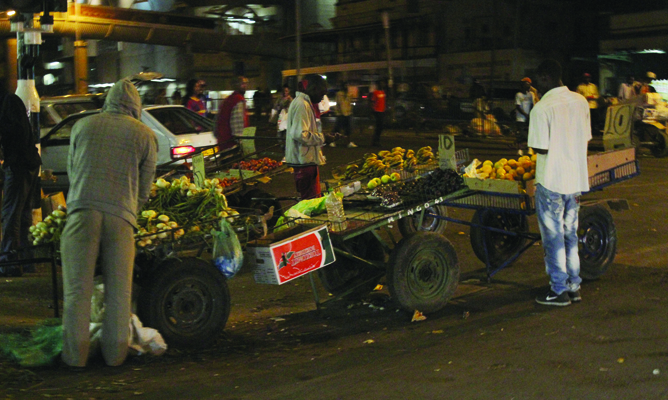
The government’s deadline for vendors to vacate undesignated vending sites in central business districts in cities and towns across the country expires today.
Besides the threats to deal with defiant informal traders ruthlessly, the government has not laid out a viable alternative for them to make a decent living.
Instead, the government has laboured to divide the vendors especially in Harare after they organised themselves to fight the unilateral decision to force them out of the streets.

The government’s apologists are desperate to paddock the vendors into political camps after they challenged Local Government minister Ignatius Chombo’s decision to evict them rather than embarking on a dialogue process to solve the chaos on the streets particularly in the capital.
There is no doubt that a lasting solution is needed to the problems caused by the swelling number of informal traders on the streets caused by the unchecked collapse of the economy.
Zimbabwe’s economy has not been growing for some time now after the end of the inclusive government in 2013 and industry has been shedding jobs at an alarming rate.
Tertiary institutions are churning out thousands of graduates who have no hope of finding employment in the near future and vending becomes the easiest way out.
- Chamisa under fire over US$120K donation
- Mavhunga puts DeMbare into Chibuku quarterfinals
- Pension funds bet on Cabora Bassa oilfields
- Councils defy govt fire tender directive
Keep Reading
However, local authorities appear not ready for this new economy because they are poorly resourced themselves. Few local authorities in Zimbabwe are able to fund capital projects because their budgets are shrinking yet they are expected to be readjusting their zoning plans to accommodate the growing ranks of the informalised economy.
The government must have learnt a lesson that criminalising the informal sector would not compensate for the lack of planning and the misplaced economic priorities after the failures of Operation Murambatsvina in 2005. Operation Murambatsvina was launched to clear slums and unregulated businesses, but in the end it destroyed livelihoods of 700 000 people and put Zimbabwe on the world map for the wrong reasons.

The roundly condemned clean-up campaign, just like the impending mass eviction of vendors, was a knee-jerk reaction to a problem that had been building up for a number of years and had its roots in the economic malaise.
Coincidentally, Chombo was in charge of the programme where the government imposed a housing programme — the infamous Operation Garikai/Hlalani Kuhle — whose failures are still an albatross on the necks of town planners today.
The government also went on to construct market stalls in urban areas that found no takers because they were located far away from potential buyers and remain a white elephant.
People chose to be on the streets because Chombo’s markets were not viable and were imposed on them.
A repeat of the same mistakes is on the horizon with the emergence of Zanu PF-aligned pressure groups such as the shadowy Queen of Grace ZimAsset Trust that the regime is trying to use to create an impression that the majority of vendors agree with the plans to dump them in obscure places.
Chombo’s plan to rope in the military to this civil issue failed spectacularly and still there are no prospects of success through a process that leans on coercion, force and dictatorship. The minister needs to swallow his pride and engage the vendors in a non-partisan manner to develop enduring policies to regulate the informal sector.
There would be no need to reinvent the wheel in this instance because there are countries that have a well organised informal sector backed by sound policies and infrastructure where Zimbabwe can learn from.
The vendors have sent out a clear message that there is no alternative to dialogue and a responsible government would listen.











